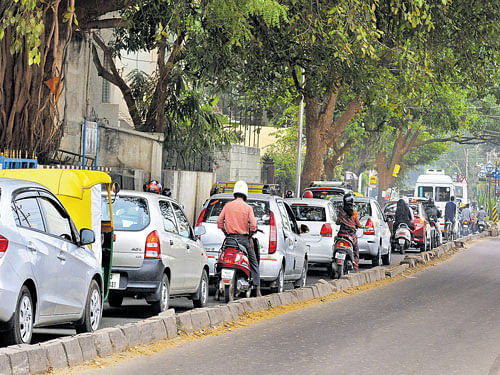
Traffic is chaotic in Bengaluru and driving into the City areas or even planning to reach somewhere is a big task. With the odd-even traffic initiative being tried out in Delhi and talks about the same on in Bengaluru, expatriates in the City share their traffic qualms and suggest what can be perfected here for a smoother ride back home.
Expatriates like Ema Trinidad, founder of ExpatLife India, who hails from Philippines, says that traffic is hectic in her home country too. “In Bengaluru, many including expatriates who are residing in Whitefield, avoid coming to the Central Business District during the weekdays as it’s very stressful. The very thought of all the honking and clutter keeps them away from these areas. Expatriates are even advised to not reside in Whitefield nowadays,” she says.
Ema adds that the odd-even traffic initiative would be a good step for Bengaluru, but people with two cars or more would not be affected. She adds, “Of the issues that Bengaluru faces, one of the most irritating ones is that many roads are narrow and there are vehicles parked on either sides of the roads. Strict rules and implementation of those will help.” She suggests that just like in Philippines, tow-away vehicles should be hired privately by the government to keep a check on this. “Also IT parks and other such organisations should be encouraged to do carpooling, which would help keep many vehicles off the road.”
The lack of lane discipline creates a lot of commotion, voices Candice Lock, a Malaysian who has also resided in the US. “A common sight here is that three to four lanes of traffic often leads to the same road, which creates bottlenecks.”
Candice adds that the law needs to be more stringent here. “In Malaysia and in the US, huge fines are slapped on perpetrators which creates fear.” She points out that “it has to be teamwork — be it the lawmakers or the citizens”. Better and planned infrastructure will also help, she says.
“Better pavements are the need of the hour. Every time a road is widened, the pavement disappears or it is either broken and there are pedestrians on the road. Also, they prefer crossing right in the middle of the road, which is scary and chaotic.”
There are other expatriates who feel that traffic is organised in Bengaluru, but it is lack of proper planning of roads that adds to traffic woes. Emilien Coquard from France, who is the CEO and co-founder of The Scalers, says, “Traffic can be very hectic at times, especially around particular areas like Silk Board, Ejipura, Koramangala and the first main junction of Indiranagar. What I have observed in these places is that there are roads leading the traffic to many other roads and this leads to a lot of confusion.”
He says that proper roundabouts around such junctions would help deviate the traffic in an organised manner. Emilien agrees that different carpooling options from cab providers like Ola and Uber are also a positive initiative in the whole run. “Especially when there are so many people travelling to the same areas like Bellandur or Whitefield, what is the logic of travelling in different cars? Carpooling helps decrease the number of cars as well as leads to a drop in pollutants in the air,” he says.
Emilien adds that ‘visual hints’ also help better traffic. “Compared to France, there are not many signs on the roads about diversions, U-turns, lanes etc. There have to be proper signs, so that one can drive smoothly and not bother others too.”
An effective public transport system would help the City’s vehicular movement, says Nicolas Mirguet, co-founder of ‘Le Casse-Croûte’, who hails from France. He says that the delayed Metro work should speed up, which would provide more travel options.
“There are only limited Metro lines functioning in the City, which doesn’t help much. Once there is a stable public transport system, cars on the roads will decrease.” He says that he’s been here since three years and feels that even road conditions contribute to slower traffic movement. “The roads are always temporarily fixed and open up after a few rain showers,” he adds.